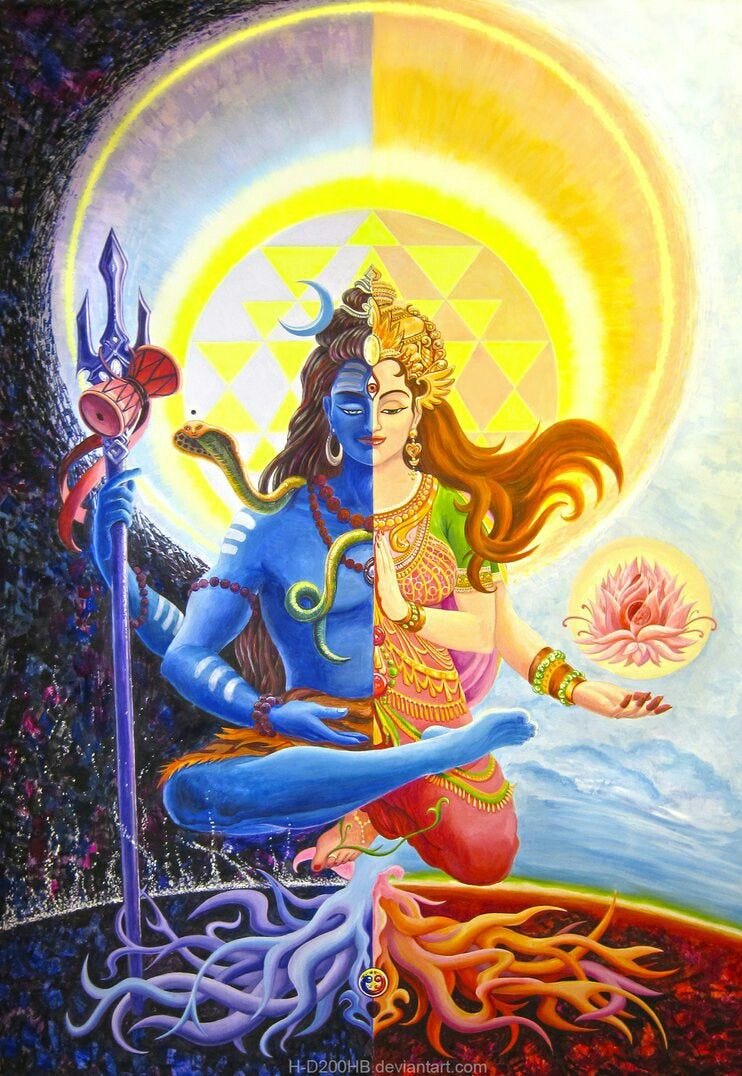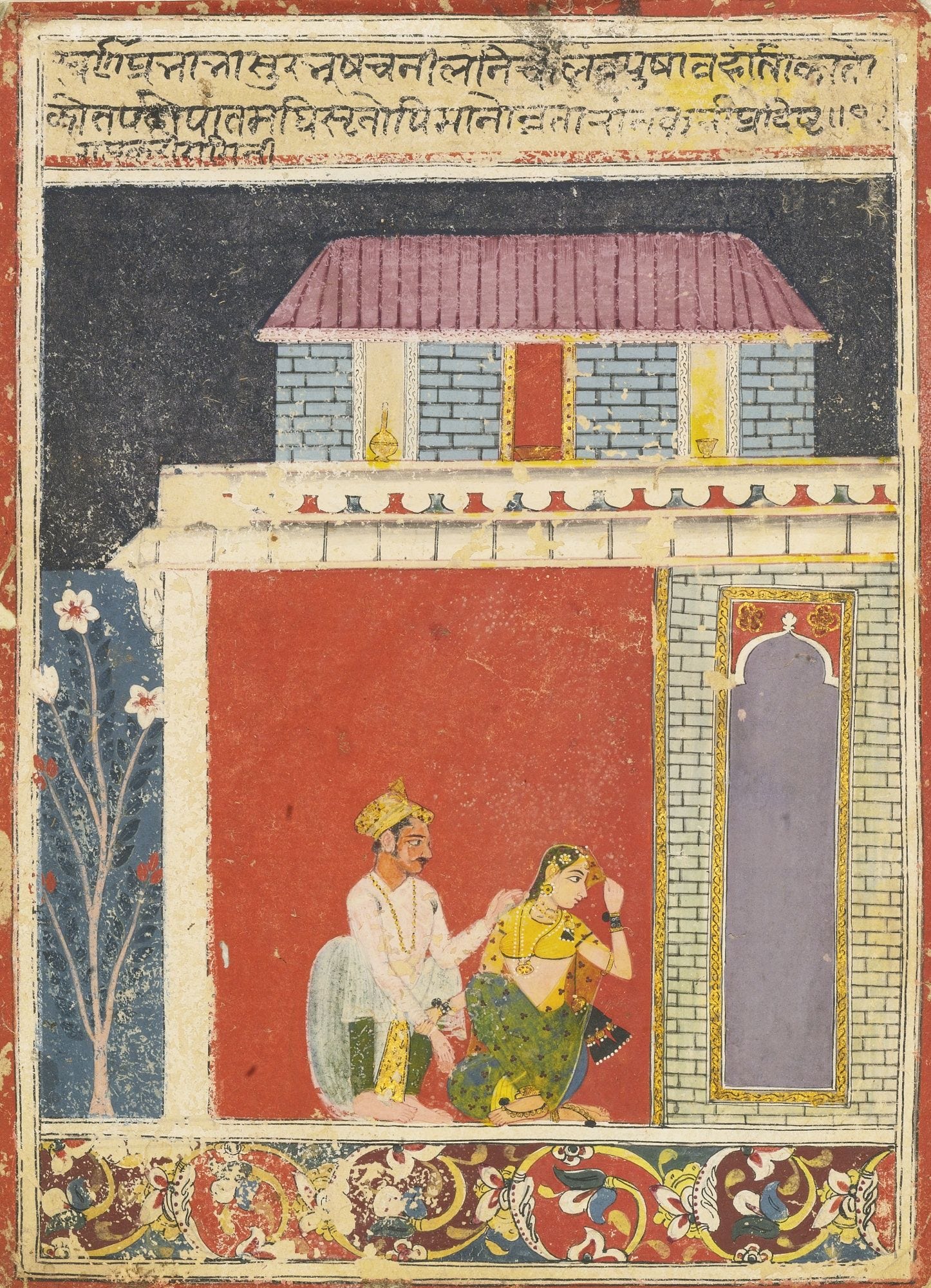The Temptation of Adi Shankara
That one time Adi Shankara inhabited a king's body to learn the art of eroticism.
Happy Friday, pagans.
We’re seven issues deep, and this newsletter I began sending to a small group of friends and family has now grown to nearly 500 subscribers. Welcome, new readers! My goal is to share interesting, profound, and sometimes zany stories from Hindu philosophy and mythology, in order to inspire others to dig a little more deeply into the tradition. This newsletter will always be free, but if you’re enjoying it, I’d deeply appreciate you taking a moment to forward to any friends or family who might like it!
The Temptation of Adi Shankara
Accounts of the legend differ. Some say the debate took seventeen days, others six months.
But no one disputes the result: Adi Shankara won. The rules were clear: the garland around Mandana Mishra's neck had withered, while the flowers adorning Shankara continued to thrive. Per the agreement, Mishra would now become Shankara's disciple.
But Mishra's wife wasn't having it.
Shankara had selected Mandana Mishra's wife, the scholar Ubhaya Bharati, to judge the debate. At the time, this surprised Mishra. Why would Shankara choose Mishra’s own wife, especially when the stakes were this high?
Had Shankara known what was about to happen, he may have chosen differently. Because now, Ubhaya Bharati was claiming that the debate was not yet over! She invoked a technicality (Hindu mythology is full of major plot twists due to minor technicalities, there needs to be a list of these). Bharati claimed that since she was Mishra's wife, she was, technically speaking, one half his person. In order to defeat Mishra, he would have to debate Bharati.
Shankara realized she had a point. Ubhaya Bharati was leveraging the concept of male/female unity, the Ardhanarishvara, embodied by the androgynous half-male/half-female combination of Shiva & Parvati.
Shankara had little choice. He accepted the argument and agreed to debate Bharati, who went right for his throat.
Bharati started asking Shankara questions about the Kamashastra, a treatise on sensuality and eroticism. This was a bold, calculated move. Bharati was married and had years of experience in the bedroom; Shankara was an ascetic who had never been with a woman.
Besides, Shankara had been debating something else entirely with her husband, something that was deeply important to him: the supremacy of thought over ritual. This was Shankara’s overarching mission - to push against the calcification of Hinduism, to do away with the blind adherence to rituals, and to re-establish Hinduism’s connection to the philosophical ideals and metaphysical insights of the ancient texts .
Here is Pavan K. Varma in Adi Shankaracharya: Hinduism’s Greatest Thinker:
What the debate actually represented—and that is the reason why it was projected as such an important part of Shankara’s life—was to assert the primacy of thought over ritual, at a time when precisely the opposite seemed to have become the accepted way of life for Hindus.
The sixth and the seventh centuries CE saw a revival of Hinduism, and the relative decline of Buddhism. However, this revival was excessively focused on Puranic mythology, blind devotionalism, and, above all, the mechanical performance of Vedic ritualism.
Somewhere, in all of this, there was a divorce from the loftiness of thought that was the essential substratum of the Hindu vision. In the pursuit of how exactly to perform a ritual as per precise Vedic injunctions, the glorious mystical insights of the Upanishads had been overwhelmed. Temples were flourishing, but there was a disconnect between the motions of worship and the philosophical foundations underlying it. There was the need to once again reassert the jnana marga to salvation, to relink Hinduism to its metaphysical insights, and restore to it the grandeur of thought and contemplation. That was the manifest purpose of Shankara, and there could be no better metaphor to project it than his victory in a debate over Mandana Mishra.
And now, Bharati was going to make him talk about sex. It was a genius move. Shankara had been blindsided. He asked Bharati for a month during which he could learn about the topic. She agreed.
Shankara then used his yogic powers to leave his body, placing it for safekeeping in a cave on the banks of the Narmada river, and his soul found the recently-deceased body of the King of Amaruka.
At that very moment, the king was being carried away for cremation. Shankara inhabited the king, and he rose from the dead, resurrected in front of his stunned subjects. They rejoiced and took him back to the palace.
Once in the palace, Shankara took full advantage of his new surroundings and began the ‘work’ of learning all he could from the dead king’s wives. Within a month, Shankara learned so much that (legend has it) he wrote one of the greatest works of erotic poetry from ancient India, the Amaru Shataka (we’ll likely never know who actually wrote it, and it really is an incredible set of poems - I‘ve included a few samples in the quotes section below).
But there was now a problem: Adi Shankara was enjoying himself. A lot. So much so that he completely forgot that he was ever Adi Shankara. As far as he now knew, he was the King of Amaruka and would live out his days in the palace, content in the company of his wives.
Hindu philosophy is full of interesting stories of interactions between kings and philosophers. They debate each other, they learn from each other, they even take over each other's bodies! Whether it’s best to live as a hedonistic king or a renunciate philosopher feels like an unsettled question underneath many of these interactions.
In this case, Shankara eventually decides to go back to the life of a philosopher, but not entirely on his own. Desperate to get their teacher back, Shankara’s students pose as musicians and enter the palace. That evening, they sing philosophical songs in his presence, reminding him of who he is. Now familiar with the art of sensuality, Shankara answers all of Ubhaya Bharati's questions. Bharati and her husband become Shankara’s disciples, and the conceptual victory of thought over ritual would re-energize the evolution of Hindu philosophy in the 7th century.
Quotes
First, from Adi Shankara, my personal favorite, from the Bhaja Govindam:
Worship Govinda, Worship Govinda, Worship Govinda foolish one! Rules of grammar matter not when the hour of death is nigh!
And now from the Amaru Shataka, the book of love poems that Shankara legendarily wrote while inhabiting s king’s body. Here is a beautiful poem about a couple’s quarrel:
Each turned aside
on the bed
silently suffering
secretly hoping to reconcile but
afraid to lose face.
At some point their furtive eyes met—
there was a quick
unintentional laugh and the
quarrel broke
in one wild embrace.
-Amaru Shataka, Verse 21
Another, about being bold in love:
You’re determined
to lead your whole life
like a child?
Develop some pride
take a risk
with a lover you need to be devious.
Her face whitened
at her friend’s admonishment—
speak softly he’ll hear you
he dwells
in my heart.
-Amaru Shataka, Verse 82








Can I find an original source of this story? It is especially interesting since I have also heard Adi Sankara state that "women are the gateway to hell, Naraka-Dhama"
This is fantastic. It's been a few years, so you may never notice that I've even commented here, but I'm recommending this Substack. I hope you come bakc and continue to write. You have a gift for storytelling that's undeniable.